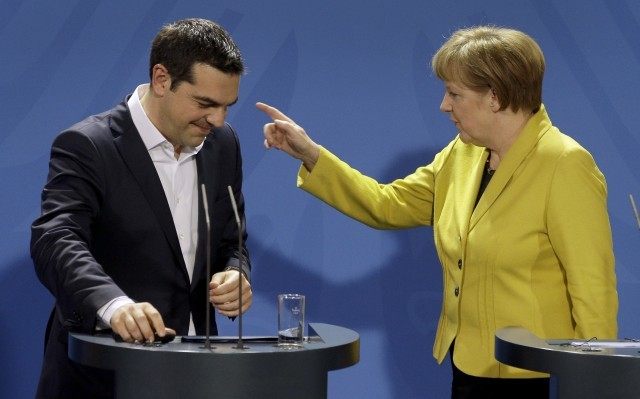Germany is demanding new coercive powers to legally compel, or “force member states,” to abide by structural reforms and binding EU-IMF fiscal “programmes”. This pits Europe’s economic powerhouse against France, a country with a record of failing to follow EU dictates and is expected to defend national sovereignty.
The leaders of the two nations, Angela Merkel and President Hollande, will hold emergency talks later today where their opposing views will be forced into the public spotlight.
After the Greek people voted resoundingly to reject the will of Brussels, basic democratic principles are looking increasingly irreconcilable with a centralized European project and a fundamental divide is opening across the continent over how to respond. The Netherlands, Finland and Austria are siding with Germany; Italy and other southern European states are siding with France.
The split is likely to dominate talks on “completing economic and monetary union,” alongside Britain’s renegotiation, which begin this autumn.
“The only instrument we have to force member states to do these reforms is the programme approach,” a senior German conservative told The Times. “In countries such as France and Italy, that need reform but have no programme, we see the lack of possibilities to force them to take the necessary steps because it is up to national politicians to decide. In a currency union, you do not have full sovereignty,” he said.
Meanwhile, French socialist and EU economic and monetary affairs commissioner, Pierre Moscovici, said, “… especially at a time when the popular vote is turning its back on Europe, I think we should not be too intrusive. We favour ownership of our recommendations on structural reforms. It is very difficult to impose on national sovereignty if you don’t want the people to be angry.”
Before the Greek referendum France was already pushing for a more lenient deal for Greece, particularly after an IMF report released on July 2nd confirmed that Greece’s debt repayment, as laid out by the EU, was not “sustainable.”
Germany’s hard stance on Greece was reaffirmed yesterday when their economic affairs minister, Sigmar Gabrie, told the Tagesspiegel Newspaper that Greece has just “torn down the last bridges on which Greece and Europe could have moved towards a compromise… With the rejection of the rules of the eurozone … negotiations about a programme worth billions are barely conceivable,” he said.
Binding programms imposed on Ireland, Portugal and Spain are seen as a huge success in Germany. Wolfgang Schaeuble, Germany’s finance minister (who is well known for his lack of little sympathy with the Greek predicament) has seen his approval rating soar to a record 70%, and 45% of the Germany people favor a Greek exit, according the new poll.
This morning Italy’s premier, Matteo Renzi, said he would encourage other EU leaders to move away from an EU model controlled by France and Germany.
“Greece is part of Europe, and the other people of the European Union owe its people their solidarity. This will in the coming days be the principle guiding Italy’s actions and I hope this will be true also for the representatives of the Greek people, other European partners and the EU’s institutions,” he said in a statement obtained by The Local.

COMMENTS
Please let us know if you're having issues with commenting.